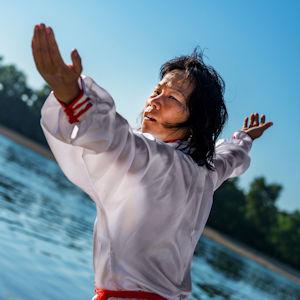Zen and Tai Chi Chuan: How They Relate For Well-Being
(what digital gadgets and easy living can’t give you)
Two areas of study and practice that I find very important for me are Tai Chi Chuan and Zen. For those with an interest in either topic, I will share what I have found is the connection between these two important practices.
Zen, a form of Buddhism, consists not only of mindfulness, but also has guidelines on ethics and behavior. The word “ethics” relates to honesty and reliability in relationships as shown in words and actions, and a livelihood that helps others or at least does not do harm. The word “behavior” relates to offering kindness, compassion, and patience to self and others.
On the other hand, in Tai Chi Chuan practice there are few teachers who will directly bring up those matters of ethics and behavior. Instead, there is much focus on mindfulness and movement.
So, mindfulness is central to Tai Chi Chuan practice, just as it is in Zen practice. But what about the parts missing in Tai Chi Chuan study and practice, that is, explicit considerations of ethics and behavior? After many decades practicing both Zen and Tai Chi Chuan, I can offer this observation: Tai Chi Chuan practice leads to a greater sensitivity of the whole person. That sensitivity is a sensitivity towards others and towards oneself.
Just to be clear, this is not the sensitivity that leads to a person feeling insulted or threatened due to negative actions of other people; it is the sensitivity that allows us to perceive directly the inherent importance of self and others. My own practice has required overcoming significant obstacles in my own mind. Gradually, with practice and attentiveness, and with wonderful teachers as well as the truths of the universe as a teacher, I learned the great lessons, and continue to learn.
We can only be fully helpful to others to the same extent that our awareness is clear and sensitive, moment by moment. Buddha said, in an overview of what Zen / Buddhism is devoted to, “Do as much good as possible, avoid doing harm, and purify your mind.”
The first two phrases are what we would expect from a religion or spiritual teaching, but the third phrase referring to purifying the mind is crucial as well. As the mind becomes more pure, sensitivity increases. This is not moralistic purity, but purity that expands perceptiveness and empathy by removing barriers to clear functioning of the mind.

Sensitivity to others means we feel connection with others, which relates to empathy, kindness, compassion, and patience. On the other hand, if we with the best intention focus only on doing good actions without purifying the mind and developing sensitivity, we will miss many important opportunities to do good and we may unintentionally do harm.
Both Zen / Buddhism and Tai Chi Chuan involve turning the light of awareness inwards. When we turn the light of awareness inward, we purify the mind, and as a result our good intentions and our words and actions work together, to positive effect.
In Tai Chi Chuan, the introspective practice following a fixed external framework (the various forms) as well as various two-person practices, increase sensitivity to self and others. When we have sensitivity, we have empathy, kindness, compassion, and patience. With that mind, we will naturally follow the ethics and attitude that is spelled out more explicitly in Zen / Buddhism.
When we open our doors of perception to the profound and beautiful nature of each human being, Tai Chi Chuan and Zen take on their fullest, most important value. Friendliness, helpfulness, patience, and all other virtues of human nature arise from this purified mind, guided by our efforts.
Note: if you want to be signed up for either or both of the two newsletters, and are not sure that you are signed up, you can sign up here for the Insight and Energy newsletter or the Tai Chi Chuan newsletter. One discusses topics like well-being, communication, Zen, and mental health. The other discusses Tai Chi Chuan and topics directly related to Tai Chi Chuan.

